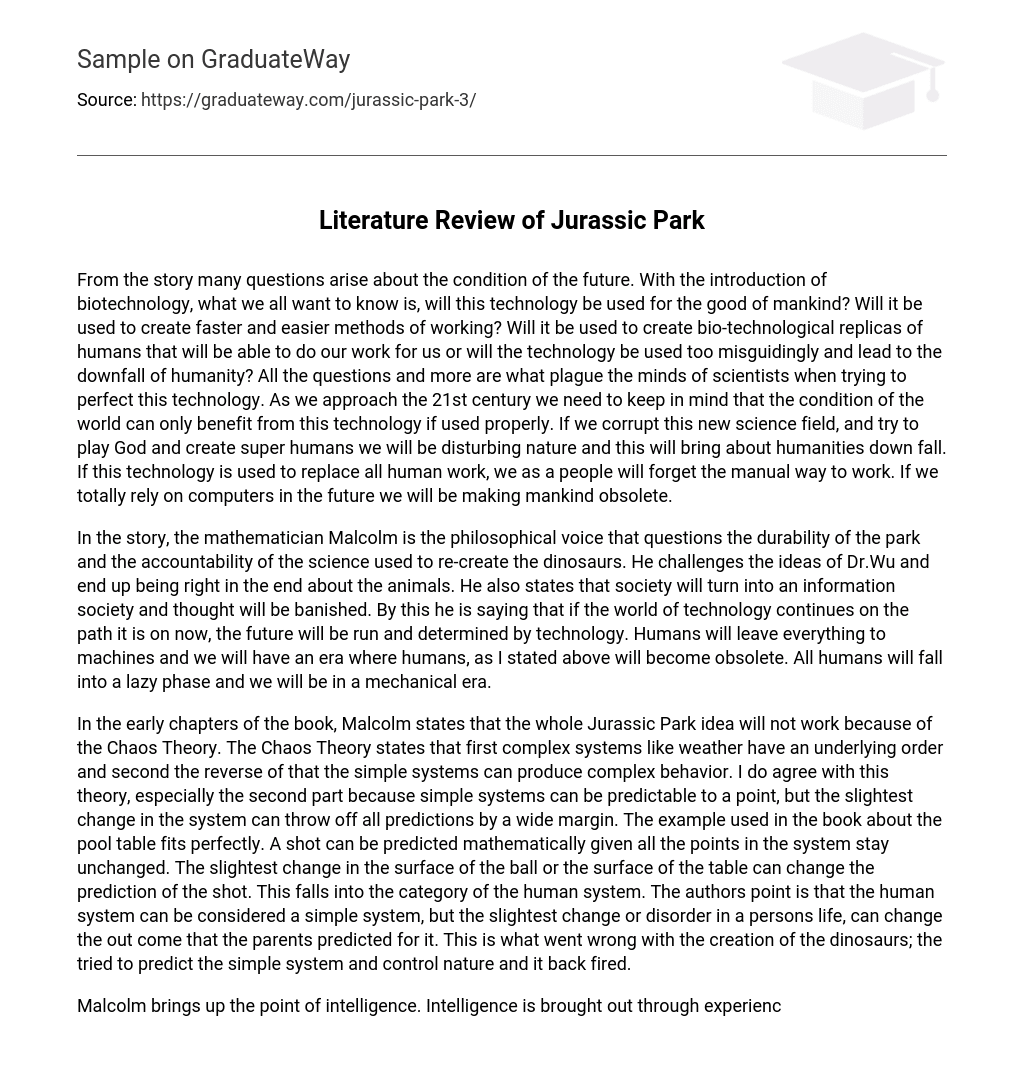Within the narrative, numerous inquiries arise regarding the forthcoming state of affairs. Notably, a key concern revolves around whether biotechnology will have a beneficial or detrimental impact on humanity. Will it enhance productivity and streamline tasks? Can it enable us to construct humanoid robots using bio-technology? Alternatively, might its reckless employment precipitate humanity’s demise?
All the questions and more are what plague the minds of scientists when attempting to perfect this technology. As the 21st century approaches, it is crucial to consider that the world can only derive benefits from this technology if it is utilized responsibly. If we taint this emerging scientific field by playing God and endeavoring to create super humans, we will disrupt nature, ultimately leading to humanity’s downfall. Similarly, if this technology is employed to replace all human labor, society will lose its knowledge of manual work. A complete reliance on computers in the future would render mankind obsolete.
In the story, Malcolm, a mathematician, serves as the voice of skepticism towards the sustainability of the park and the accountability of the scientific methods utilized to recreate the dinosaurs. He challenges Dr. Wu’s ideas and eventually proves his point about the nature of the animals. Malcolm also predicts a future society dominated by information and void of critical thinking. Essentially, he suggests that if technology continues its current trajectory, humans will relinquish control to machines, resulting in an era where humans become obsolete and laziness prevails.
In the early chapters of the book, Malcolm argues that the concept of Jurassic Park is destined for failure due to the Chaos Theory. This theory suggests that complex systems, such as weather, possess a hidden order, while conversely, simple systems can exhibit intricate behavior. I concur with this theory, particularly its second aspect, as simple systems can be somewhat predictable until a small modification to the system greatly disrupts all predictions.
The analogy used in the book about the pool table is highly relevant. If all the elements in the system remain constant, a shot can be accurately predicted using mathematics. However, even the smallest alteration to the ball’s surface or the table’s surface can alter the shot’s outcome. This aligns with the human system, which can be considered a relatively simple system. Yet, even a slight change or disruption in a person’s life can lead to an unexpected outcome, contrasting with what their parents may have anticipated for them. This is precisely what went awry when attempting to predict and control nature in the creation of dinosaurs.
Malcolm discusses the concept of intelligence, emphasizing that it is developed through life experiences, education, and natural learning processes. In contrast, computers are equipped with programmed intelligence, which is the knowledge and abilities embedded in machines and similar computer systems.
Science is commonly viewed as a quest for truth, yet Malcolm asserts its deceitful nature. In actuality, science strives to gain dominion over nature and render it foreseeable. Nonetheless, past events have demonstrated that when humans endeavor to manipulate nature, it frequently triggers adverse reactions and unanticipated outcomes, occasionally culminating in human fatalities.
The overlooked question by scientists is not their capability but rather their responsibility. It is worrisome that many scientists do not contemplate the potential consequences and impact of their choices and experiments on human well-being. Although they argue that breaking a few eggshells is necessary for making an omelet, it is crucial to recognize that science can extend beyond just a few eggs, leading to disastrous outcomes for humanity.
In his book, Malcolm discusses the juxtaposition between scientific power and power derived from discipline. Scientific power can be seen as a shortcut, involving utilizing others’ work and passing it off as one’s own, akin to plagiarism. It is comparable to taking someone else’s efforts, appending your name to it, and receiving undeserved recognition. Conversely, power attained through discipline relies on an individual’s unique ideas and diligent labor. It entails investing time and effort towards achieving a goal and rightfully earning credit for it. Any alternative method would be regarded as uncivilized.
When discussing the end of a scientific era, it is noted that the world’s complete reliance on technology is the cause. Computers will serve as the foundation for everything, rendering human thinking obsolete. Machines will become the dominant power on Earth, leading to mankind’s decline. The destruction of the world and its manageability are also deliberated upon. It is asserted that we lack the ability to destroy this planet; our attempts would not even come close.
Our planet, which is approximately 4.5 billion years old, has experienced numerous geological transformations, witnessed various animal species, and despite scientists’ warning of its possible destruction, its resilience should not be disregarded. Throughout its existence, the Earth has endured numerous threats and is expected to persevere long beyond the human era.
Ultimately, the novel discusses the concept of subjecting nature to manipulation and coercion in order to extract its hidden truths. However, it becomes evident that attempting to control and dominate nature leads to disastrous consequences. This is evident from cautionary examples like the tragic sinking of the Titanic. Nature possesses an overwhelming power, and if allowed to follow its natural course, the world would be better off. Yet, when humans try to play the role of gods, nature swiftly puts us back in our rightful place. Certain aspects of nature remain unconquerable, serving as a reminder that there are certain enigmas best left undisturbed.





